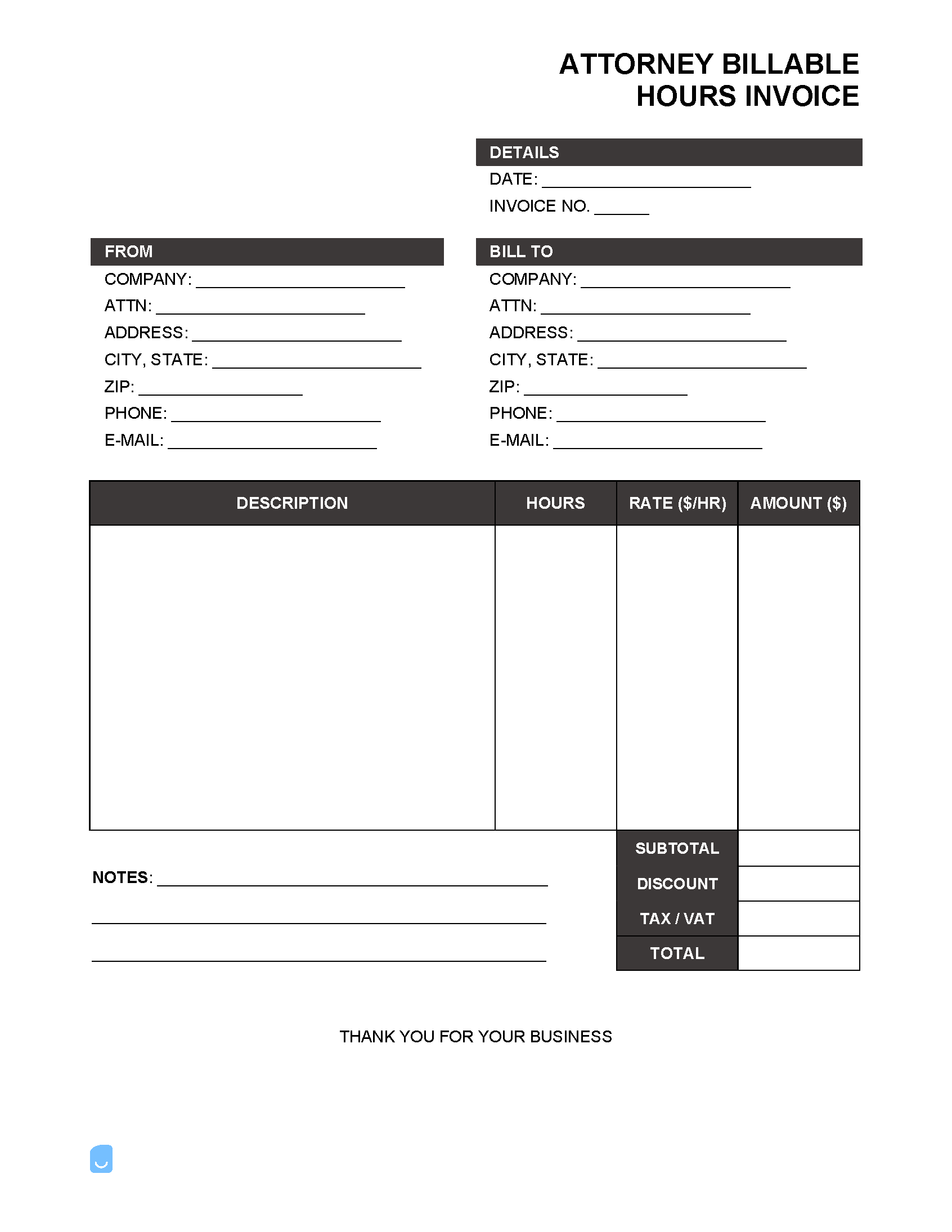Attorney Billable Hours Invoice Template
An attorney billable hours invoice is a bill or invoice that documents legal services provided by a licensed attorney, or lawyer, and requests payment from the client who engaged the services. An invoice can also request payment for a retainer, which is a fee required by an attorney prior to beginning the process of representing a client.
How to Create an Attorney Billable Hours Invoice
An attorney, or lawyer, is someone who is licensed by their state to practice law. Attorneys legally prosecute and defend clients, which can be individuals or businesses, in court. All licensed attorneys must have completed law school and passed their state’s bar exam. The range of work they do includes court appearances, consultations, filing, and research, among other responsibilities. Attorneys can work in various areas of law, including maritime, bankruptcy, corporate, civil, criminal, entertainment, environmental, family, health, immigration, intellectual property, labor, real estate, and tax, among others.
How Attorneys Charge
Attorneys bill clients for time spent preparing for cases and expenses incurred while working on a case, ranging from travel costs to court filing fees. While billing practices depend on the lawyer or law firm, rates are generally calculated by tracking the number of hours spent on a client’s representation in a case and dividing that number by the number of hours considered billable. The complexity of a case can also influence a billable rate. An incident of petty theft would require less thought, time, and expertise than, for example, a capital murder case. Lawyers itemize and document billable hours on an invoice, then send it to clients.
Attorney Billing Methods
Legal billing methods vary depending on the lawyer, but the most common are hourly rates, flat fees, and contingency fee billing. Hourly rates vary based on the attorney’s experience, the complexity of a case, the work being done, and the location where the work is being done. Attorneys who bill on an hourly basis will track hours by maintaining a daily log of work related to the case, which includes the date, time, and duration of each activity, as well as a description of what was done. Tracked hours include such activities as research, writing, and meeting with clients and witnesses related to the case.
Contingency Fees
Attorneys who charge on a contingency basis are essentially agreeing that if they do not win in court and their clients are not awarded a payout, they do not get paid. A typical contingency fee is one-third to 40 percent of any damages awarded to the client by the court. However, the contingency fee can vary depending on the size of the monetary settlement to which the client is laying claim. This type of arrangement makes legal services more affordable for indigent clients and incentivizes lawyers to win, but critics contend that it also encourages frivolous lawsuits and early settlement.
Retainer Agreements
A retainer fee can mean several things. One is a down payment on a lawyer’s fee, which goes toward the total cost of the services rendered. A retainer could also be an upfront fee that secures a lawyer’s availability for a particular period of time, which may not be refunded even if the client does not use the lawyer’s services. In order to reduce the risk of disputes with clients, it’s wise for attorneys and clients engaging their services to discuss the attorney’s billing and invoicing system and factors that will affect the balance due before work begins.
Average Attorney Charges
Lawyer bills will depend on the lawyer’s experience, the location of their practice, and the size of their firm, as well as other factors such as the complexity of the case. However, the average attorney charges around $200 per hour.
Salary & Hourly Rate ($/hr)
Salary: $148,030/yr (source: BLS) Hourly Rate: $71.17/hr (source: BLS)
How to Find an Attorney
Finding an attorney is simpler than most people realize. Each state has its own “Lawyer Referral Service” program that helps internet users connect to verified and trusted attorneys. Most law firms join this service in order to expand their reach, so the selection pool is large. Other trusted websites also list approved attorneys for hire, as well as their rates and reviews submitted by customers.
Top 3 Websites for Finding Attorneys
- Avvo – Use this website to view rated lawyers.
- Thumbtack – This can be used to post a job as well as to select from attorneys with reviews and hourly rates.
- UpCounsel – Through this website, users can lodge a request for legal services and receive offers from lawyers.
How to Create an Attorney Invoice
Use an online invoice generator or an Invoice Maker template to generate an attorney billable hours invoice. Alternatively, use Microsoft Word, Excel, or Google Docs to manually create an invoice that contains the details below:
- Name of attorney
- Attorney’s law firm
- Attorney’s address
- Attorney’s phone number
- Attorney’s email address
- Date
- Name of client
- Client’s address
- Client’s phone number
- Client’s email address
- Description of work
- Number of hours
- Billable hours
- Attorney’s hourly rate
- Invoice number
- Payment terms
